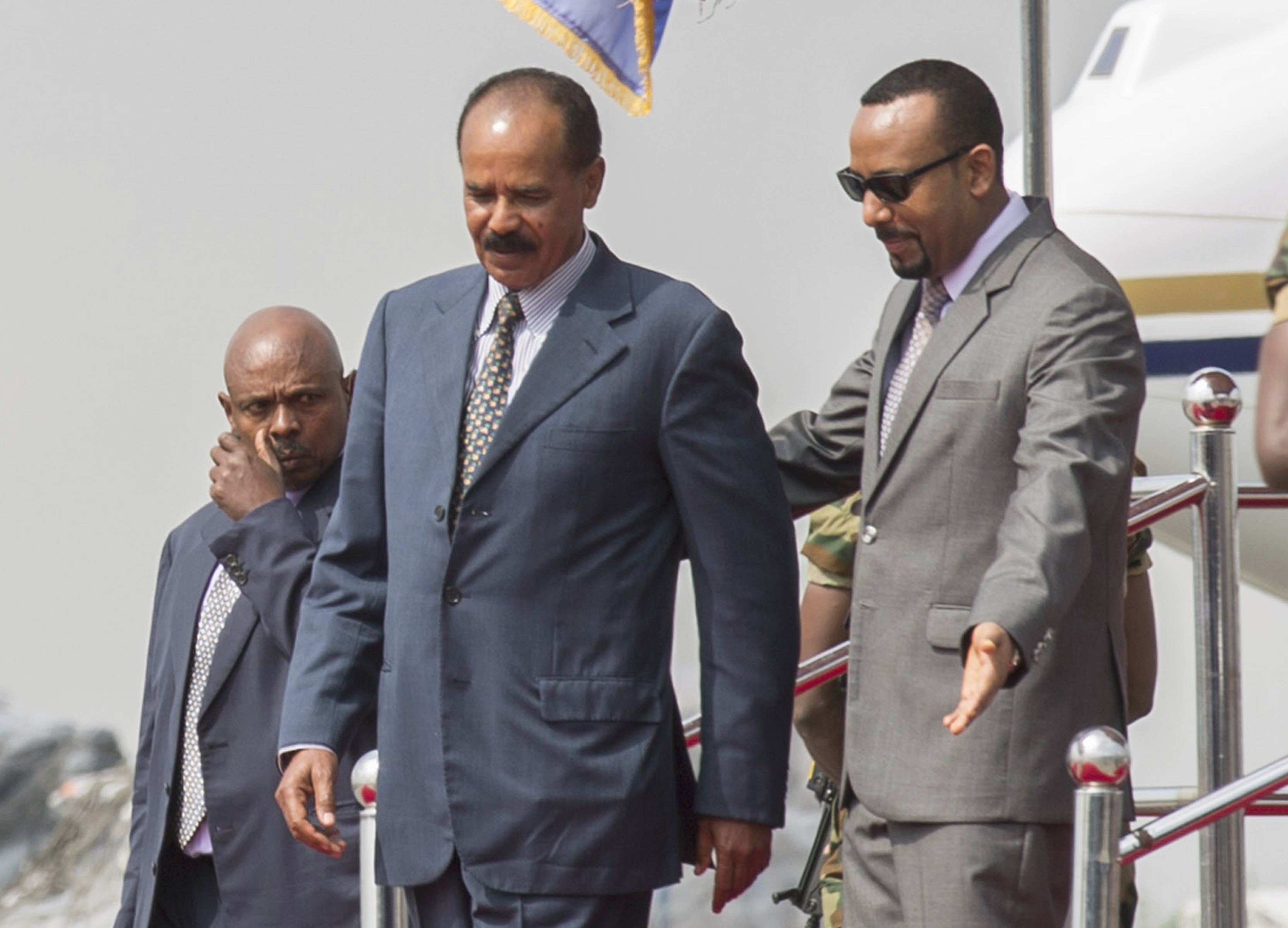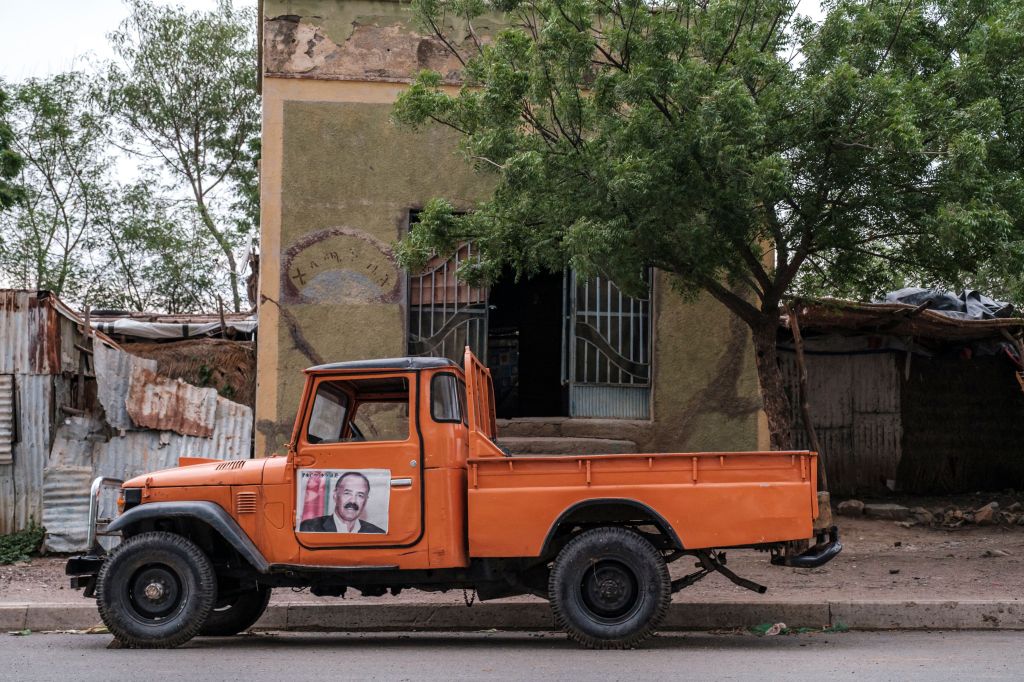Eritrea is one of the world’s most reclusive nations with a reputation as both a regional power broker and a pariah state. It’s been ruled with an iron fist by the same dictator for almost three decades and has one of the largest armies in Africa, but no constitution, independent judiciary, free press, elections, or legislature. President Isaias Afwerki makes the rules, and those who disobey disappear.
“Everyone I’ve worked with is in jail or dead. If the government really dislikes you, they’ll stuff you in a shipping container in the Afar region and leave you to die alone in 50-degree heat in complete darkness,” Martin Plaut, a senior research fellow at the University of London who has studied Eritrea for over 40 years, told VICE World News.
Videos by VICE
Eritrea is also currently the only country in Africa – and the only country in the world other than North Korea – not to have started vaccinating its population against COVID.
John Nkengasong, the head of the African Centres for Disease Control, says that the 55 African Union (AU) states are “not giving up” on getting Eritrea to join the continent’s vaccine drive. How anyone could persuade Isaias to change course, though, is a difficult question to answer, as no one can say with certainty why he has decided to reject offers to join the COVAX vaccine-sharing initiative.
Representatives from GAVI the vaccine alliance, the World Health Organisation, and UNICEF – the main organisations responsible for getting Eritrea to engage with COVAX – all declined to be interviewed by VICE World News for this article.
Those who did speak offered a range of theories as to why Isaias is avoiding vaccinating his own citizens. Most said the calculations are entirely political, and linked to the conflict in the Tigray region of Ethiopia that has spread to other parts of Ethiopia.
The fact that the WHO Director-General Tedros Adhanom Ghebreyesus is a former member of the Tigray People’s Liberation Front (TPLF) – the same group that President Isaias is now waging a war against in Ethiopia – was frequently cited.
“For President Isaias, accepting vaccines from the WHO-COVAX programme means accepting vaccines from an organisation managed by a former TPLF member – a person his regime is actively vilifying,” a source familiar with the matter, who asked not to be named for security reasons, said.
“There is propaganda in Eritrea about COVAX being a new Western weapon to destroy Africans and take the continent’s wealth,” said Samson Solomon, an Eritrean civil resistance activist, based in Europe.
“It’s rumoured President Isaias won’t join COVAX because he doesn’t want to see Tedros find success in his job because he’s Tigrayan. It’s a rumour, but if you know President Isaias, it makes sense,” he continued.

Another compounding issue is that Isaias’s position has always been that Eritrea doesn’t require outside aid, a stance that has seen him refuse offers of help throughout the pandemic. The most prominent example came in March 2020, when Chinese billionaire Jack Ma sent ventilators, medical supplies, and PPE to governments across the African continent, and Eritrea was the only country to reject the donation.
Isaias’ stance against international aid doesn’t apply to the Eritrean diaspora though, which according to state media has reportedly donated some $5 million (around £3.8 million) to the regime’s COVID-19 relief effort, via a mysterious online funding page endorsed by numerous Eritrean politicians.
“COVID is a milking cow for President Isaias as the diaspora is willing to give their money to the effort without asking any questions,” a source familiar with the matter who asked not to be named for security reasons, told VICE World News over email.
Official figures from Eritrea’s Ministry of Health would suggest the government’s response to the virus is working, as there have been low case levels and deaths reported in Eritrea since the onset of the pandemic. But everyone VICE World News spoke to for this article strongly questioned the validity of the government’s data, and those with family and friends inside Eritrea painted a vastly different picture.
“There is a COVID task force in Eritrea, but nobody knows who is in this task force or what they do. There is no direct report. The only information we get is from the government-owned media, and it doesn’t reflect the real situation. For a PCR test, one has to pay $100…so you can imagine how much of the population are getting checked,” Solomon said.
The Eritrean Research Institute for Policy & Strategy (ERIPS), a US-based think tank founded by Eritreans that has launched a campaign called #AllowCOVAXforEritrea, described the Ministry of Health’s figures as a “gross underestimation.”
“The numbers don’t match the rate of mortality currently being reported from family and friends in Eritrea…they say that so many people are getting sick and mention a number of individuals that died of suspected COVID-19 in their neighbourhood. There seems to be misinformation people are dying from Dengue Fever and Pneumonia as well,” a spokesperson for ERIPS told VICE World News.
“People don’t want to be tested when sick because if positive, the government takes them away from their home for quarantine. Those unfortunate enough to die of COVID in hospital, don’t have their bodies released to their families, which is a huge departure from religious and cultural norms. As a result, many patients don’t seek medical attention,” the representative added.
For Eritrea’s “elite” though, ERIPS says it’s a different story, as most are “taking advantage of getting vaccinated in neighbouring countries.”
VICE World News repeatedly contacted the Eritrean Ministry of Health by phone and email to ask for a breakdown of its case numbers and to offer representatives a chance to be interviewed, but no one responded. Calls were also made to several hospitals in the capital of Asmara, to inquire about case levels in their COVID wards, but no one was permitted to speak on the record.
While the COVID-19 infection levels in Eritrea will likely remain a mystery for some time, the epidemiological risks of leaving an entire nation unimmunised are unequivocal.
“This decision makes the entire country a cauldron of virus stew, with essentially unlimited opportunity for the virus to reproduce and generate new variants,” Emanuel Goldman, a Professor of Microbiology, Biochemistry and Molecular Genetics at New Jersey Medical School, told VICE World News.
“It’s extremely irresponsible, bordering on insanity. Most of the country’s population will get sick and die. Some survivors will suffer from ‘long COVID’, ruining their lives despite having survived the initial infection, and citizens of Eritrea will be banned from traveling to other countries. The country will be the equivalent of a leprosy colony, isolated and reviled,” he continued.
Exactly how Isaias might be persuaded to launch a vaccination program while waging a costly war that seems to be draining all his country’s resources and captivating his attention, is an open-ended question. But two of the regime’s most crucial allies, the United Arab Emirates and Saudi Arabia, which share friendly relations with President Isaias and played a highly visible role in the Eritrea-Ethiopia peace process of 2018, could be in a unique position to apply pressure.
“A lot of Isaias’ money is kept offshore in the Gulf states in a mixture of private and public accounts. If you wanted to put pressure on Isaias, the UAE and the other Gulf states are the places you could do it,” said Plaut, the London-based Eritrea expert.
More
From VICE
-

Ron Levine / Getty Images -

Schulte Productions / Getty Images -

MacBook Air M1 — Credit: NguyenDucQuang for iStock Editorial/Getty Images -

Screenshot: Supergiant Games

